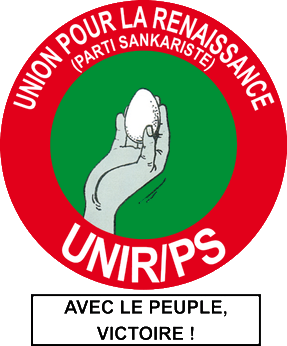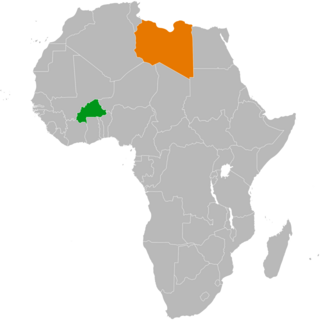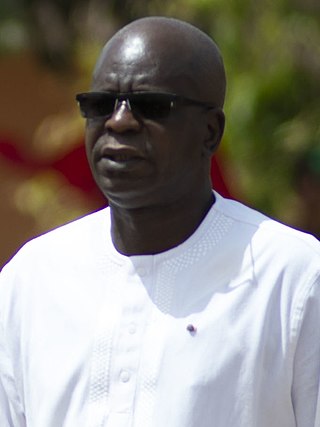Related Research Articles

Burkina Faso is a landlocked country in West Africa. It covers an area of 274,223 km2 (105,878 sq mi), bordered by Mali to the northwest, Niger to the northeast, Benin to the southeast, Togo and Ghana to the south, and Ivory Coast to the southwest. As of 2021, the country had an estimated population of 23,674,480. Previously called the Republic of Upper Volta (1958–1984), it was renamed Burkina Faso by President Thomas Sankara. Its citizens are known as Burkinabè, and its capital and largest city is Ouagadougou.

Thomas Isidore Noël Sankara was a Burkinabè military officer, Marxist revolutionary and Pan-Africanist who served as President of Burkina Faso from his coup in 1983 to his assassination in 1987.

Blaise Compaoré is a Burkinabé-Ivorian former politician who served as the second president of Burkina Faso from 1987 to 2014. He was a close associate of the first president, Thomas Sankara, during the 1980s and in October 1987 he led a coup d'état during which Sankara was killed. Subsequently, he introduced a policy of 'rectification', overturning the leftist and Third Worldist policies pursued by Sankara. He won elections in 1991, 1998, 2005, and 2010, in what were considered unfair circumstances. His attempt to amend the constitution to extend his 27-year term caused the 2014 Burkinabé uprising. On 31 October 2014, Compaoré resigned, whereupon he fled to the Ivory Coast. In April 2022, he was found guilty by a special military tribunal of complicity in Sankara’s murder. He is also the longest-serving president of Burkina Faso.

Jean-Baptiste Philippe Ouédraogo, also referred to by his initials JBO, is a Burkinabé physician and retired military officer who served as President of Upper Volta from 8 November 1982 to 4 August 1983. He has since mediated a few national political disputes and operates a clinic in Somgandé.

The Union for Rebirth / Sankarist Party was a political party in Burkina Faso.

Chantal Compaoré, born Chantal Terrasson de Fougères is the Franco-Ivorian wife of former President Blaise Compaoré of Burkina Faso. Born in the Dabou, Ivory Coast, after becoming the First Lady in 1987 she spent much of her time on charity work in Burkina Faso. Her husband, who came to power in a bloody 1987 military coup, was overthrown in the 2014 Burkinabé uprising. Chantal Compaoré was subsequently forced to flee to her home country, going into exile together with her husband.

Sankarism is a term sometimes applied to denote a left-wing ideological trend within the politics of Burkina Faso, a landlocked country in West Africa, as well as the policies of the military government led by Captain Thomas Sankara. Sankara came to power in what was then the Republic of Upper Volta in a popularly supported 1983 military coup, and ruled until his assassination in a coup led by Blaise Compaoré in 1987.
The Committees for the Defense of the Revolution were systems of local revolutionary cells, established in Burkina Faso by the Marxist-Leninist and pan-Africanist leader Thomas Sankara, President of the country from 1983 until his assassination in 1987. Committees were established in each workplace. They were inspired by the Committees for the Defense of the Revolution in Cuba, and functioned as "organs of political and social control."

The Pioneers of the Revolution was a youth organisation in Burkina Faso, modelled along the pattern of the pioneer movements typically operated by communist parties, such as the contemporary Pioneers of Enver, José Martí Pioneer Organisation and Agostinho Neto Pioneer Organisation. The Pioneers of the Revolution organised children of all ages. Much like many other young pioneer movements, such as the Vladimir Lenin All-Union Pioneer Organization and the Young Pioneers of China, the most distinct sign of the Pioneers were their red scarves, joined by rudimentary uniforms and yellow berets.
Major Jean-Baptiste Boukary Lingani was an officer of Army of the Republic of Upper Volta executed on September 19, 1989 along with Henri Zongo by Blaise Compaoré who accused them of plotting a coup. Lingani was set by Laurent Sédego, Gilbert Diendéré, Hermann Yaméogo, Issa Tiendrébeogo and his cousin Alain Ouilma of national safety department.
Mariam Sankara is the widow of Thomas Sankara, the President of Burkina Faso from 4 August 1983 until his assassination on 15 October 1987. During this time she was First Lady of the country. Thomas Sankara, a Marxist and pan-Africanist army officer, became President of what was then known as the Republic of Upper Volta after a military coup in August 1983. He carried out what he proclaimed to be, the "Democratic and Popular Revolution", implementing many radical reforms. Sankara was killed in a coup in October 1987, orchestrated by his former friend and colleague Blaise Compaoré.

Burkina Faso–Libya relations refers to the current and historical relationship between Libya and Burkina Faso. Libya maintains an embassy in the Burkinabé capital of Ouagadougou, and Burkina Faso has an embassy in the Libyan capital of Tripoli.
Tout-à-Coup Jazz was a musical group formed in the Republic of Upper Volta in the 1970s, during the military rule of Colonel General Sangoulé Lamizana. In French, tout à coup is an adverb meaning "suddenly" or "out of the blue". As the name indicates, the band played jazz, and is said to have been relatively popular. The band included Captain Thomas Sankara on guitar and his close friend, Captain Blaise Compaoré, on the microphone.
Le Balai Citoyen, is a political grassroots movement in Burkina Faso, which was part of the opposition against President Blaise Compaoré. It was co-founded by two musicians, reggae artist Sams’K Le Jah and rapper Serge Bambara ('Smockey') in the Summer of 2013. They organized several protests in early 2014, for example hosting a joint rally with the newly formed Movement of People for Progress, filling a 35,000-capacity sports stadium to its rafters.
Serge Bambara is a hip hop artist, actor and political activist from Ouagadougou, the capital of Burkina Faso. Born in what was then the Republic of Upper Volta, the son of a Bissa father and a French mother, he moved to France to study in 1991. In 1999 he signed a contract with EMI and launched a first single, featuring the singer Lââm. In 2001 he moved back to Burkina Faso and started the studio Abazon. He has released the albums Epitaphe, Zamana, Code noir and Cravate Costards et Pourriture, and cooperated with the prominent Senegalese rapper Didier Awadi.
The 1989 Burkina Faso coup d'état attempt was allegedly an attempt at a military coup d'état, planned by Jean-Baptiste Boukary Lingani and Henri Zongo, in addition to other unnamed conspirators. The plot, as described by the government of Burkina Faso, targeted President Blaise Compaoré – who, together with Lingani and Zongo, had previously carried out two coups in the country. All known conspirators were quickly executed.
The 1982 Upper Voltan coup d'état took place in the Republic of Upper Volta on 7 November 1982. The coup, led by Colonel Gabriel Yoryan Somé and a slew of other junior officers within the military, many of them political radicals, overthrew the regime of Colonel Saye Zerbo. Zerbo had previously taken power just under two years prior to his own downfall.

Chérif Moumina Sy is a Mauritanian-born Burkinabé politician who served as the transitional Head of Parliament from 2014 to 2015.
On 4 August 1983, a coup d'état was launched in the Republic of Upper Volta in an event sometimes referred to as the August revolution or Burkinabé revolution. It was carried out by radical elements of the army led by Thomas Sankara and Blaise Compaoré, against the regime of Major Jean-Baptiste Ouédraogo. Ouédraogo had been brought to power in a 1982 coup with the Conseil de Salut du Peuple (CSP), a body composed of military officials of different ideological backgrounds. The CSP chose Sankara as Prime Minister of Upper Volta in January 1983. As his tenure progressed, Ouédraogo found himself unable to reconcile the conservative and radical factions of the CSP, whose disagreements were leading to a political stalemate. On 16 May he purged his government of pro-Libyan and anti-French elements, disbanded the CSP, and had Sankara and several other important officials arrested. This move sparked discontent among Sankara's supporters. Sankara was eventually released while one officer, Compaoré, began to organise military resistance to the government.

Soumane Touré was a Burkinabé politician and trade unionist. He was a prominent student activist during his youth and joined the communist African Independence Party (PAI). He served as the general secretary of the Burkinabé Trade Union Confederation (CSB) for many years and was a prominent leader of the Patriotic League for Development (LIPAD) mass movement. He was arrested on several occasions by different governments and even sentenced to death in 1987, only escaping execution through an intervention by then president Thomas Sankara. He was elected to the National Assembly in 2002 and ran for president in 2005.
References
- 1 2 "Sams'k Le Jah nous parle de son itinéraire, de son engagement, du reggae, du Rastafari, de Hailé Sellasié, de Sankara, de la révolution burkinabé, des artistes africains..." www.thomassankara.net (in French). April 2007. Retrieved 8 November 2014.
- 1 2 Duval Smith, Alex (30 April 2014). "'Africa's Che Guevara': Thomas Sankara's legacy". British Broadcasting Corporation . London . Retrieved 8 November 2014.
- ↑ Manson, Katrina; Knight, James (2012). Burkina Faso. Chalfont St Peter: Bradt Travel Guides. p. 105. ISBN 978-184-162-352-8.
- ↑ Saidykhan, Musa (24 April 2007). "Burkinabe reggae king's life on firing line". afrol News . Retrieved 8 November 2014.
- ↑ Moussaoui, Rosa (3 November 2014). "Sams'K Le Jah "Les héritiers de Sankara ont grandi, il faut désormais compter avec eux"". L'Humanité (in French). Paris . Retrieved 8 November 2014.
- ↑ Mackey, Robert (31 October 2014). "Street-Level Views of the Protests in Burkina Faso". The New York Times . New York City . Retrieved 8 November 2014.